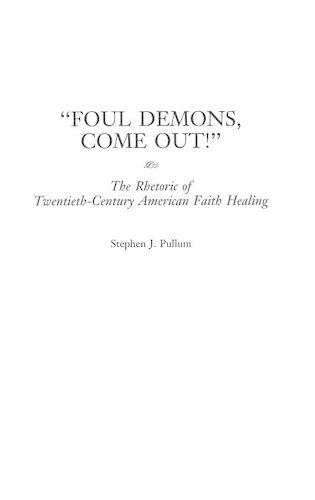
Foul Demons, Come Out!: The Rhetoric of Twentieth-Century American Faith Healing
(Hardback)
Publishing Details
Foul Demons, Come Out!: The Rhetoric of Twentieth-Century American Faith Healing
By (Author) Stephen J. Pullum
Bloomsbury Publishing PLC
Praeger Publishers Inc
30th July 1999
United States
Classifications
Tertiary Education
Non Fiction
Complementary, integrated and alternative medicine and therapies
Christianity
Spirituality and religious experience
615.8520973
Physical Properties
Hardback
200
Width 156mm, Height 235mm
482g
Description
Pullum examines the rhetorical genre of 20th-century American faith healing. He first analyzes respectively the rhetoric of Aimee Semple McPherson, William Branham, Oral Roberts, Asa Alonzo Allen, Ernest Angley, Kathryn Kuhlman, and Benny Hinnthe most prominent American faith healers of this century. For each, he discusses their background, the nature of the audiences to whom they preached, and why they were so successful. Pullum concludes by drawing together the major rhetorical features of faith-healing discourse. Pullum shows that faith-healing discourse follows the strategy of offering hope to the hopeless, giving God the glory, articulating humble beginnings, offering testimony of past personal afflictions overcome, and drawing on scripture to bolster their claims. This discourse is often presented in dynamic fashion, making it not only credible, but entertaining as well. After elucidating the rhetorical patterns of faith healers, Pullum evaluates claims of the miraculous in light of the standard that they set for themselves. In other words, miracles as presented by faith healers are juxtaposed to the types one reads about in the Bible. Pullum also attempts to account for why people claim miraculous cures in spite of the fact that nothing miraculous has occurred in the services of faith healers.
Reviews
[a] significant contribution to scholarship addressing ministerial work of individuals in the pentecostal movement, which has until fairly recently been negelected by the academic community. His analysis of rhetorical style and techniques, however, it is truly groundbreaking and will serve as a springboard for further research. Pullman's comparison of Biblical and modern "miracles" is especially useful because he makes the comparison not as an apologist or as a debater, but as a thoughtful academic.-Florida College
Besides being well research and written in captivating prose (together with some good photographs), the author has managed to capture a sense of that wildly diverse entity, the relationship between audience and faith healer....Pullum has contributed to the field of historical homiletics by asking preachers to consider rhetorically just how, why, and for whom faith-healing rhetoric is used and whyit enjoys such popularity.-Homiletic
"a significant contribution to scholarship addressing ministerial work of individuals in the pentecostal movement, which has until fairly recently been negelected by the academic community. His analysis of rhetorical style and techniques, however, it is truly groundbreaking and will serve as a springboard for further research. Pullman's comparison of Biblical and modern "miracles" is especially useful because he makes the comparison not as an apologist or as a debater, but as a thoughtful academic."-Florida College
"Besides being well research and written in captivating prose (together with some good photographs), the author has managed to capture a sense of that wildly diverse entity, the relationship between audience and faith healer....Pullum has contributed to the field of historical homiletics by asking preachers to consider rhetorically just how, why, and for whom faith-healing rhetoric is used and whyit enjoys such popularity."-Homiletic
"[a] significant contribution to scholarship addressing ministerial work of individuals in the pentecostal movement, which has until fairly recently been negelected by the academic community. His analysis of rhetorical style and techniques, however, it is truly groundbreaking and will serve as a springboard for further research. Pullman's comparison of Biblical and modern "miracles" is especially useful because he makes the comparison not as an apologist or as a debater, but as a thoughtful academic."-Florida College
Author Bio
STEPHEN J. PULLUM is Associate Professor of Communication Studies and Associate Dean of the College of Arts and Sciences at the University of North Carolina at Wilmington. He has published numerous articles on religious rhetoric, and he is a former associate editor of the Journal of Communication and Religion.
